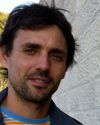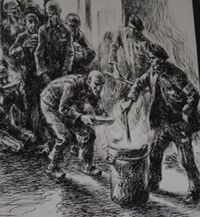Student-films bring survivors' voices back to Czech borderlands A high school teacher's project for his class draws regional attention to Holocaust history, current ethnic and social issues
After signing the Munich Agreement in September 1938 and under the pretext of protecting the interests of ethnic Germans who agitated for Nazi rule, Hitler annexed the Czechoslovakian borderlands. While some still hoped that giving up Czechoslovak territory would bring peace, the agreement signed by Great Britain, Germany, Italy, and France meant the beginning of occupation for the citizens of Czechoslovakia.
Ethnic and social tension was a challenge to peace in the borderlands before World War II, and it’s still a challenge. So is antisemitism; when a Holocaust memorial in the city of Česká Lípa was vandalized in 2008, international attention returned to a region in the Czech Republic where Nazism once flourished. But these days, the city is attracting a different kind of attention, thanks to student films that use Holocaust survivor testimony to chart a better course for the borderlands today.


Holub recently launched the second year of his filmmaking project, with a new class of students.
“At the Institute, we talk about the ‘power’ of testimony; well, Vojtěch Holub and his students are demonstrating what that really means,” said Martin Šmok, Senior International Program Consultant for the Institute. “With their own creativity and initiative, they’ve stirred up regional interest in learning about the Holocaust, and they're interpreting survivors’ stories in ways that confront the current ethnic and social strife in the borderlands. None of this would be possible without testimony."